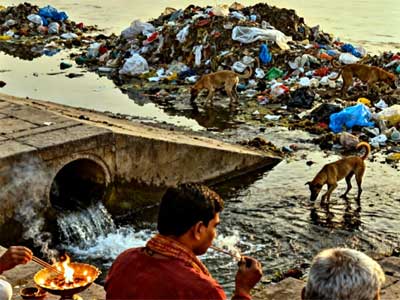As dusk descends along the Yamuna’s banks in Mathura, the sounds of temple bells and chanting priests mingle with the fragrance of burning incense. Devotees gather, seeking purity and redemption.
Yet, behind the rituals lies a harsh reality: plastic waste swirls in the current, chemical foam glows in the fading light, and the river, the lifeline of millions, groans under the burden of neglect. It’s a scene repeated along the Ganga, Kaveri, and Narmada.
Read in Hindi: मदद के लिए पुकार रही है नदियां, क्या हम सुनेंगे...?
What’s unfolding on India’s riverbanks is more than an environmental decline; it’s a defining moment calling for action. The struggle now is not just about clean-up drives or awareness campaigns, but it’s about survival, justice, and, ultimately, a revolutionary change in how we perceive our rivers. The fight is to secure legal rights for rivers, the same dignity we afford our temples.
Dr Devashish Bhattacharya, an environmentalist, warns, “India’s rivers, once worshipped as goddesses, are now enduring their greatest crisis. Ganga, Yamuna, and other streams have become toxic veins, choked by untreated sewage, factory waste, sand mining, and the unbridled construction of dams. Festive respect for these waters stands in cruel contrast to the reality, plastic bottles, pathogens, and poisonous chemicals now pollute the sacred flow. Expensive government schemes like ‘Namami Gange’ have become hollow slogans as pollution rises and so-called ‘development’ chokes our rivers.”
Countries around the world are changing course. Ecuador, Colombia, and New Zealand have granted legal rights to rivers and natural systems. New Zealand’s Whanganui River is now a legal person, a living entity in the eyes of the law, meaning harming the river is as grave an offence as harming a human.
India nearly took such a step in 2017, when the Uttarakhand High Court recognised the Ganga and Yamuna as legal persons entitled to protection and restoration. Yet, political hesitation and legal gridlock soon buried the judgment. Had this recognition survived, rivers could have brought their polluters to court, perhaps altering the story of India’s environment for good.
“The situation is dire,” says Jagannath Poddar of Friends of Vrindavan. “The Ganga basin irrigates a quarter of India’s land, sustains 400 million people, and nurtures countless creatures. Farmers, fishers, endangered dolphins, and crocodiles all depend on these rivers. Yet, dams have dried up the upper reaches, and drains and chemicals have poisoned the Yamuna downstream.”
Relentless sand mining, river-linking schemes like the Ken-Betwa project, and unchecked riverfront development have hollowed out our waterways. Climate change makes things worse; the Gangotri Glacier now shrinks by 22 meters every year, twice as fast as two decades ago. The results threaten not just biodiversity, but agriculture, public health, and the very soul of Indian culture, says biodiversity expert Dr Mukul Pandya.
In 2014, the ruling BJP promised to restore the Ganga’s flow and purity. Today, the situation is grimmer than ever, with even basic meetings of the National Ganga Council not taking place. Environmental laws pale in comparison to the force of economic priorities.
Prof Parasnath Chaudhary, a river scholar, explains, “Granting rights to rivers means respecting their right to flow, to remain clean, to nourish life, and to maintain their cultural identity. Rivers need guardians who can take polluters to court, demand compensation, and oversee rejuvenation efforts.”
But genuine guardianship requires far more than bureaucracy. It calls for the involvement of fishermen, farmers, local communities, traditional custodians, and civil society, just as New Zealand’s Māori people safeguard their rivers. An independent, politically insulated body should watch over each river system, from the Himalayas to the delta. That is the real path forward.
Yet legal rights alone are not enough. Our society and culture must change too; we need to see rivers not as resources to exploit, but as relatives to cherish. Political parties must move beyond empty promises and firmly enshrine rivers’ rights in their core agendas.
If we continue to ignore these warnings, our rivers, like the ancient civilisations that vanished with their lost waters, will disappear too.
Ensuring rivers the right to speak and to seek justice might just be our last hope for reviving both our environment and our collective spirit.
















Related Items
Temple economy emerging as a parallel billion-dollar sector
Pakistan’s Future: For whom the bells now toll?
Failed Tale of Modi Missions: Rivers are weeping, Cities are gasping